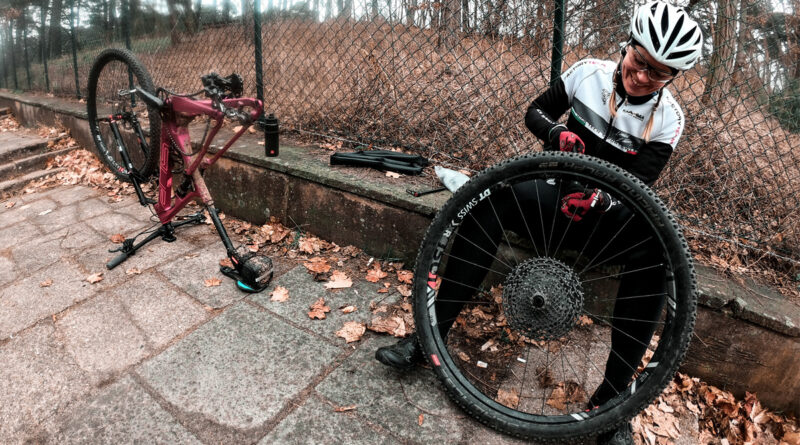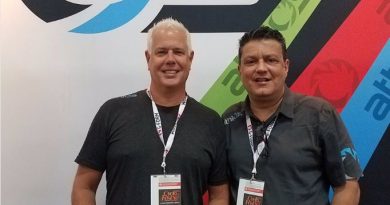“When sales departments think marketing is pointless, it’s a huge mess”
Business strategy might not sound quite as sexy as, say, the latest Specialized but if you want to sell more of those premium bikes then having a sales, marketing, design and leadership team that is working well together is a must. Katya Gasenko brings a wealth of experience to those in the cycle industry working on marketing, strategy or ideally a bit of both…
Bringing in expertise outside the cycling industry is a common theme here at CIN Towers, always keen to examine best practice from other markets and borrow good ideas from outside the cycle market where possible.
This is an area that Katya Gasenko, Founder of the newly minted Marketing 4Cycling, has form in. Katya has always been focused on marketing and advertising since the very beginning of her career, but in different sectors including interior design, tourism and events.
Katya’s early professional experiences helped convince her that marketing shouldn’t be an afterthought and should be intrinsically linked to most business activities: “I became head of a huge tourism company when I was just 23. I joined as a Marketing Manager to manage the national campaign but I just started taking care of other things. They saw the potential and what I was doing and made me Deputy Director. It was super thrilling. But it’s why I can never separate marketing from the business and the strategy.
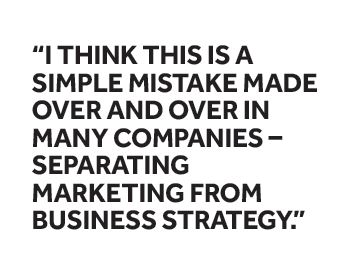
“I think this is the simple mistake that is made over and over in many companies, especially in the bike industry. Because when the engineering department thinks that the marketing department is just a waste of time and money, and sales departments also thinks that marketing is something that is pointless, that they don’t need to collaborate and keep each other informed, then it’s a huge mess, because everybody is actually wasting time. And trying to, you know, to pull the line to their side, instead of working together.”
Having not expected to turn her cycle passion into a profession – and naturally cautious about the dangers of turning a hobby into something career orientated – Katya found herself offering to help a local bike shop during some downtime: “I went to my local bike shop in the summer but there were no workers, just the owner with a line of impatient clients. So, I ended up spending two months there. I was doing all sorts of stuff, including some repairs on bikes. It was also pretty unusual to see a woman doing that for customers. I felt really good and I understood that I wanted to keep working with bikes.” 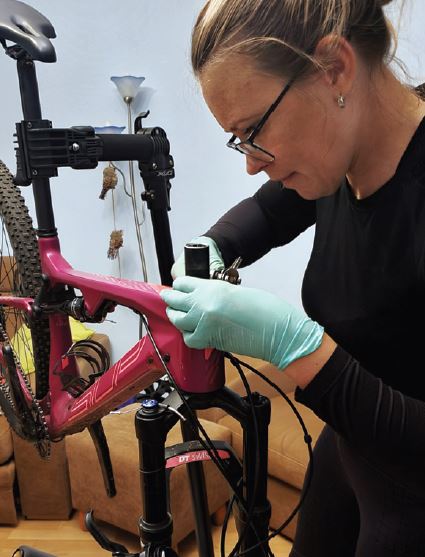
A stint with a Polish distributor of premium bikes followed and then later engaged a recruitment agency while developing a new career direction, where Katya helped improve their website and lead projects: “We basically started working together. I saw that the company was almost seven years old but they had no brand awareness built. They were doing the same work over and over and there was not much of an understanding of marketing. But I built an awareness for the business through LinkedIn and I also built up my audience, which worked for the brand and for me. I was building up a name for myself, getting recognised and getting some trust from people. At some point, I decided that I needed to get back to marketing full time.”
Marketing and business strategy
“The way I see it, the cycling industry is really great, but it still has a lot of a lot of problems, especially when it comes to professional approach, business planning, risk management, marketing and putting it all together. This is where Marketing 4 Cycling comes in.”
It can be hard to make changes from within, Katya acknowledges: “I thought about getting a job in one of the companies, but I see a lot of problems that would be really hard to fix if you just work in a team and not come in as an outside expert. If you build a name for yourself, people tend to trust the outside expert more, maybe because you show you can manage your own business. And people tend to listen to those opinions more carefully.”
Establishing a new cycle business during one of the market’s biggest slumps is no mean feat, but there’s a logic behind it: “I think that for suppliers and manufacturers it is a hard time indeed. But on the other hand, that’s why they need really, really good strategy, good management and really good marketing. Because that’s what we’ve seen with, for example, cycle startups. Most of them will fail. For me, it is a good chance to help them not to.”
“For me, it is more interesting to work with different companies. I don’t like a copy and paste approach, I like to find an individual approach. Some people can be really surprised with my frankness. I’ve just been talking with a potential client and I told him that I’m not here to complement what he has right now. I’m here to help him put it to the next level. If I can see a problem I talk about it straightforwardly. There’s no point being just nice and polite, we’re in business and business is harsh. You want your business to look and work professionally, or you will not move forward.”
Marketing tips
Down to brass tacks – are there any quick fixes or tips for cycle businesses looking at marketing and strategy?
CIN has spent considerable time highlighting the need to get better at welcoming non-cyclists into the fold. It’s a point that Katya elaborates on: “I think that one huge gap that exists in the bike industry is the educational part. And it works for both people involved in the industry and people that you want to sell bikes to.
“It is common thing, if you come for the group ride for the first time, you can always spot those guys who will be looking down at you, who will be expecting you to fail, make mistakes, be too slow or have too little knowledge… it would be much better and much more inviting and engaging for new cyclists to turn it around. To help them to gain knowledge, to help them to learn new things. And to help them increase their strength or improved their performance. I think this would be a better approach than just showing off great bikes.”
That thinking also extends into a different approach from the broader industry: “I love bikes, especially high performance, they are a piece of art every time. But for people who are just starting, it’s completely out of reach, at least for most of them. So it’s irrelevant. It’s beautiful. But it’s irrelevant, because it costs £10,000. So, I think that the approach needs better understanding of non-cyclists and inviting them instead of scaring them off.”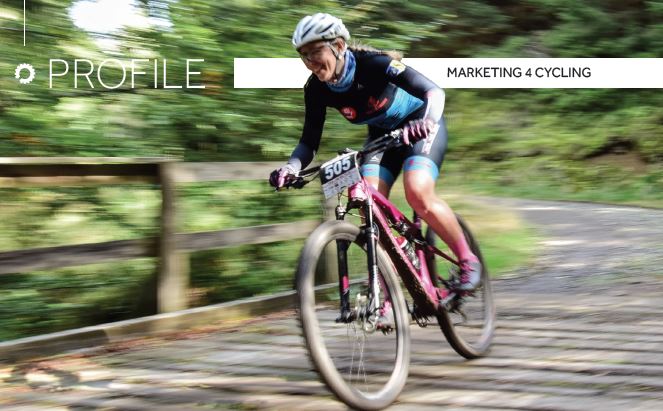
Online presence can’t be overlooked or just an afterthought either, Katya contends: “Lots of companies, even some well-known brands, don’t pay enough attention to how they look online. And online is where up to 78% of people first look for a product or service and only afterwards that they decide to buy it or not. So, it is crucial to take very good care of that.
“The other problem is the lack of proper strategy for social media. Because it is definitely not enough to just spontaneously come up with some content without knowing what you’re going to do tomorrow or in a month or where it is all going. You definitely need a good strategy for it.”
That strategy has to be reflected offline too: “If you go to a shop which is nicely designed and appealing, it works on your psychology. It makes a much better impression than a messy place with no character. It’s part of the brand. If you want to build your brand, you need to take care of every single detail. The shop, the proposition, the branding itself, the way your people attend to customers, what kind of services you offer? Then how do you take care of your community, online and offline? How will you engage them? With weekend rides, or some kind of maybe educational events that you can organise during winter in your shops? There are lots of ideas that can be implemented to make your physical shop more attractive for people from your area.
“The cycling industry is an emotional industry. You don’t buy bikes because you need them. It’s not like buying medicine, it’s an emotional purchase. And the more you spend, the higher the emotions. So touching the bike and seeing it in person is important. And people in the bike industry are very positive so it’s really easy to get sucked in with their enthusiasm.”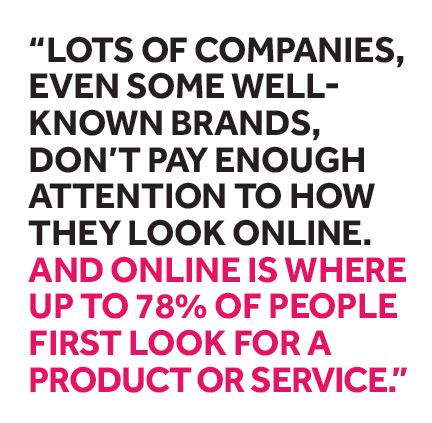
Passion for the industry
Through her time in the tourism world, Katya has seen the potential transformative impact of eBikes. “We are seeing cycle tourism gaining more and more attention. I travel a lot and see a huge change. I can see lots of people cycling around Europe, taking tours and they are mostly over 50. Those are the people with buying capacity and capability. They have money, maybe they have more time. I think there’s pretty good potential in it. It is understood there is a future and a need. And there is interest and there’s money. Because, you can’t have a business without income.”
“My goal is to build an agency. While I can do a lot of things by myself, I know that it’s much better to have a team. For me, personally, it is better to be a manager and strategist, to help people who are in my team to develop.
“I cannot stay cold and irrelevant. For my work, I need to have a passion for it. That’s basically why I’m in the bike industry. And I need to feel excitement and you know, love and this storm of ideas when I’m talking about something new about the project and brands.”
